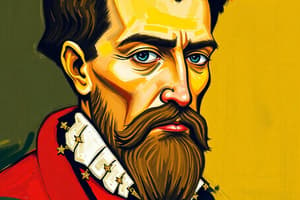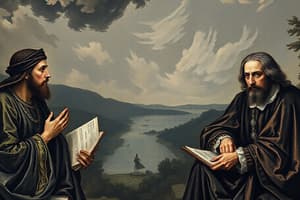Podcast
Questions and Answers
What is a primary trait a successful leader must possess according to Machiavelli?
What is a primary trait a successful leader must possess according to Machiavelli?
- Cunningness (correct)
- Compassion
- Fortitude
- Honesty
According to Machiavelli, which of the following statements best captures the role of fear in leadership?
According to Machiavelli, which of the following statements best captures the role of fear in leadership?
- Fear is less effective than love in managing subjects.
- Fear leads to resentment but assures loyalty.
- Fear is unnecessary if one is a benevolent leader.
- Fear guarantees obedience but can provoke hatred if excessive. (correct)
What does Machiavelli mean by 'the ends justify the means'?
What does Machiavelli mean by 'the ends justify the means'?
- Means used in governance should always be approved by the populace.
- Leaders should act morally regardless of the consequences.
- Actions taken to achieve political outcomes can be morally questionable. (correct)
- Political actions must always align with ethical standards.
Which quality is considered detrimental to a leader's reputation by Machiavelli?
Which quality is considered detrimental to a leader's reputation by Machiavelli?
What type of support does Machiavelli identify as the best defense against conspiracy?
What type of support does Machiavelli identify as the best defense against conspiracy?
Machiavelli suggests that maintaining independence and political stability requires prioritizing which aspect?
Machiavelli suggests that maintaining independence and political stability requires prioritizing which aspect?
Which of the following does Machiavelli consider a highly desirable trait in a ruler?
Which of the following does Machiavelli consider a highly desirable trait in a ruler?
What does Machiavelli identify as the best mark of an intellect?
What does Machiavelli identify as the best mark of an intellect?
What is the primary concern of Machiavelli's political theory?
What is the primary concern of Machiavelli's political theory?
Which of the following terms best describes someone who uses cunning and pragmatic strategies in politics?
Which of the following terms best describes someone who uses cunning and pragmatic strategies in politics?
According to Machiavelli, what should a ruler do regarding cruelty?
According to Machiavelli, what should a ruler do regarding cruelty?
What does the term 'Virtus' signify in Machiavelli's political thought?
What does the term 'Virtus' signify in Machiavelli's political thought?
Which of Weber's types of authority is NOT mentioned in relation to Machiavelli's thought?
Which of Weber's types of authority is NOT mentioned in relation to Machiavelli's thought?
What does Machiavelli imply about the nature of men?
What does Machiavelli imply about the nature of men?
In Machiavelli's view, what is the significance of 'Fortuna'?
In Machiavelli's view, what is the significance of 'Fortuna'?
What characterization does Machiavelli give to a ruler's public image?
What characterization does Machiavelli give to a ruler's public image?
Flashcards
Machiavelli's Political Thoughts
Machiavelli's Political Thoughts
Power is the central concern of politics, and rulers should be skilled in acquiring and maintaining it.
Virtus
Virtus
A ruler's ability, skill, and decisiveness in shaping their destiny and responding to challenges.
Fortuna
Fortuna
Luck or chance; beyond human control but can be mastered through preparedness & bold action.
Machiavellian
Machiavellian
Signup and view all the flashcards
Moral Flexibility
Moral Flexibility
Signup and view all the flashcards
Power and Authority
Power and Authority
Signup and view all the flashcards
Nature of Men (Machiavelli)
Nature of Men (Machiavelli)
Signup and view all the flashcards
Use of Cruelty
Use of Cruelty
Signup and view all the flashcards
Machiavelli's view on leadership
Machiavelli's view on leadership
Signup and view all the flashcards
Fear vs. Love (Leadership)
Fear vs. Love (Leadership)
Signup and view all the flashcards
Popular Support (Leadership)
Popular Support (Leadership)
Signup and view all the flashcards
Effeminacy (Leadership)
Effeminacy (Leadership)
Signup and view all the flashcards
Parsimony (Leadership)
Parsimony (Leadership)
Signup and view all the flashcards
Prowess (Leadership)
Prowess (Leadership)
Signup and view all the flashcards
Understanding things for oneself (Leadership)
Understanding things for oneself (Leadership)
Signup and view all the flashcards
War and Military Strength (Leadership)
War and Military Strength (Leadership)
Signup and view all the flashcards
Study Notes
Machiavelli: The Prince
- Machiavelli was an Italian diplomat, philosopher, historian, and writer during the Renaissance.
- His most famous work is The Prince, a treatise on political theory.
- Machiavellian refers to individuals who employ cunning, amoral and pragmatic political strategies.
- The central concern of politics is power.
- A powerful ruler must prioritize maintaining a strong and loyal military.
- Popular support is a ruler's best defense against conspiracies.
- The ends justify the means. Machiavelli believed that moral outcomes justified any political actions taken to achieve them.
- A leader should appear virtuous but be willing to act immorally when necessary.
- Machiavelli believed men were naturally deceitful.
- Cruelties should be inflicted all at once to avoid provoking hatred.
- Virtus in Machiavelli’s theory refers to a ruler’s skill, decisiveness, and ability to shape their destiny.
- Fortuna, in this theory, is luck or chance beyond control. Mastery of Fortuna comes through preparation and bold action.
- Effective leadership requires a combination of strength (like a lion) and cunning (like a fox).
- Effiminacy is a leadership quality leading to undeserved disdain.
- Parsimony (thrift and economy) is a desirable trait of a prince.
- Prowess (skill and bravery) are best means to becoming a prince.
- The ability to understand things for themselves is a sign of intellect.
- Weber's three types of authority are traditional, rational-legal, and charisma.
Studying That Suits You
Use AI to generate personalized quizzes and flashcards to suit your learning preferences.




